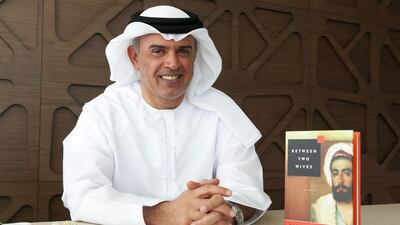‘A life that I have been coping with for nearly three decades and finally had the courage to testify to, revealing secrets that were kept hidden within its walls for so long. I apologise. I apologise to those who fell victim to my life: myself first.”
These lines in Between Two Wives, a book by Hussain Ali Lootah, an Emirati lawyer and poet, capture the heart of this semi-autobiographical narrative of the author's life with two wives.
It’s an honest account of his life and his marriage to two women from different backgrounds: his first wife is Emirati; the second Ecuadorian. Through the character “Yusuf”, the author shares his views on marriage, family, racism, customs and Jinn.
“I wrote this book to share my experience with family and friends and people who have been curious about my life for a long time,” says Lootah, 56, who is a father of nine children and six grandchildren.
“It is not a book written to explain the religious rules of multiple wives, nor do I pretend to be an expert. It is my personal journey and what I went through when I decided to marry for a second time. I felt guilty for causing pain to myself and to those people around me.”
Published by Motivate Publishing last July, Lootah will be a guest author at the Emirates Airline Festival of Literature on March 10. The novel will be published in Arabic, the language in which it was originally written, this month. “I chose English as I wanted more people to read the book,” he says.
Readers meet Yusuf as he is suffering chest pains. He complains about feeling “exhausted most of the time” and how he needs to have an honest look at his life. Readers are then transported to his traditional childhood in which his father was a seaman and falconer. Yusuf as a young man wonders about traditions and marriage, and readers are introduced to his first wife Aliyaa, who struggles after the death of her parents before their marriage in 1984. After the couple settle down, the readers meet Maria, who marries Yusuf in 1986.
What follows is Yusuf’s struggle living two separate lives (in Dubai with Aliyaa and with Maria in Abu Dhabi), with fears of backlash from both of the wives’ families if either find out.
“Fear! Fear for the zillionth time... He was afraid of Aliyaa’s reaction and its aftermath on her and their children. But he was much more afraid of the negative change, the glances and attitude he would get from Aliyaa’s cousins and family,” the book reads.
A fire at Maria’s house results in Yusuf confessing to Aliyaa. Yusuf then endures interference from his community, including accusations that he was bewitched by Maria.
“One of the nearest to Yusuf even used to introduce him to others as a poet, an attorney at law and the spouse-of-two, as if this last attribute was some kind of profession or skill that he had to be known for,” it reads.
Yusuf then works multiple jobs to take care of everyone financially, and each wife tries to help out the best she can. Aliyaa “sent her children to public schools instead of private ones” and Maria “bought a sewing machine to embroider towels and sell them.” Yusuf finally becomes successfully and sets up a law firm, and yet his troubles are not over. The novel ends in ambiguity with a far from simple solution: “You owe a duty to yourself.”
“I am a deeply responsible person,” says Lootah, who spent more than four years writing his book. He has already published four poetry works and is working on another.
“At times the responsibility as a husband weighed heavy on me and I have struggled meeting my own standards in both the relationships. So at times, as portrayed in the book, I have felt sorry for myself.
“Many who wanted to marry another came to me and asked my advice, and I would tell them the truth, that it is not easy. Marrying for the wrong reasons will have serious consequences.”
The book, he says, got a mixed reception. “For Emiratis, multiple wives is a completely normal situation and commonly understood as a cultural and religious practice. So, I believe some are able to relate to the experience. For some expats, this may be a completely foreign practice and they may resist the concept as being different from what they perceive as a normal relationship.
“Whatever the view, I believe those who read my book should read with an open mind and embrace the differences and similarities. There is something to gain from everyone’s experience.”
At the same time, he is careful to explain that this book is “not a judgment” on multiple marriages, but a personal account. “I am just telling my story,” he says.
“The greatest misconception in my view is that multiple marriages are similar to extra-marital relations. Islam allows a man to marry four times and so each is a legal wife,” he says. His wives are supportive of him telling the story.
“They saw me writing up the draft and saw how it was bringing me peace,” he says. “I know I was taking a risk by opening up, but sometimes it is important to take risks for real change to happen, even if the change is within.
“Writing this book was therapeutic for me and I changed as a result of it. I made peace with myself.”
• Hussain Ali Lootah is speaking about Between Two Wives at the Emirates Airline Festival of Literature on March 10 at 6pm. For more information and to book tickets, visit www.emirateslitfest.com
Rym Ghazal is a columnist at The National.

